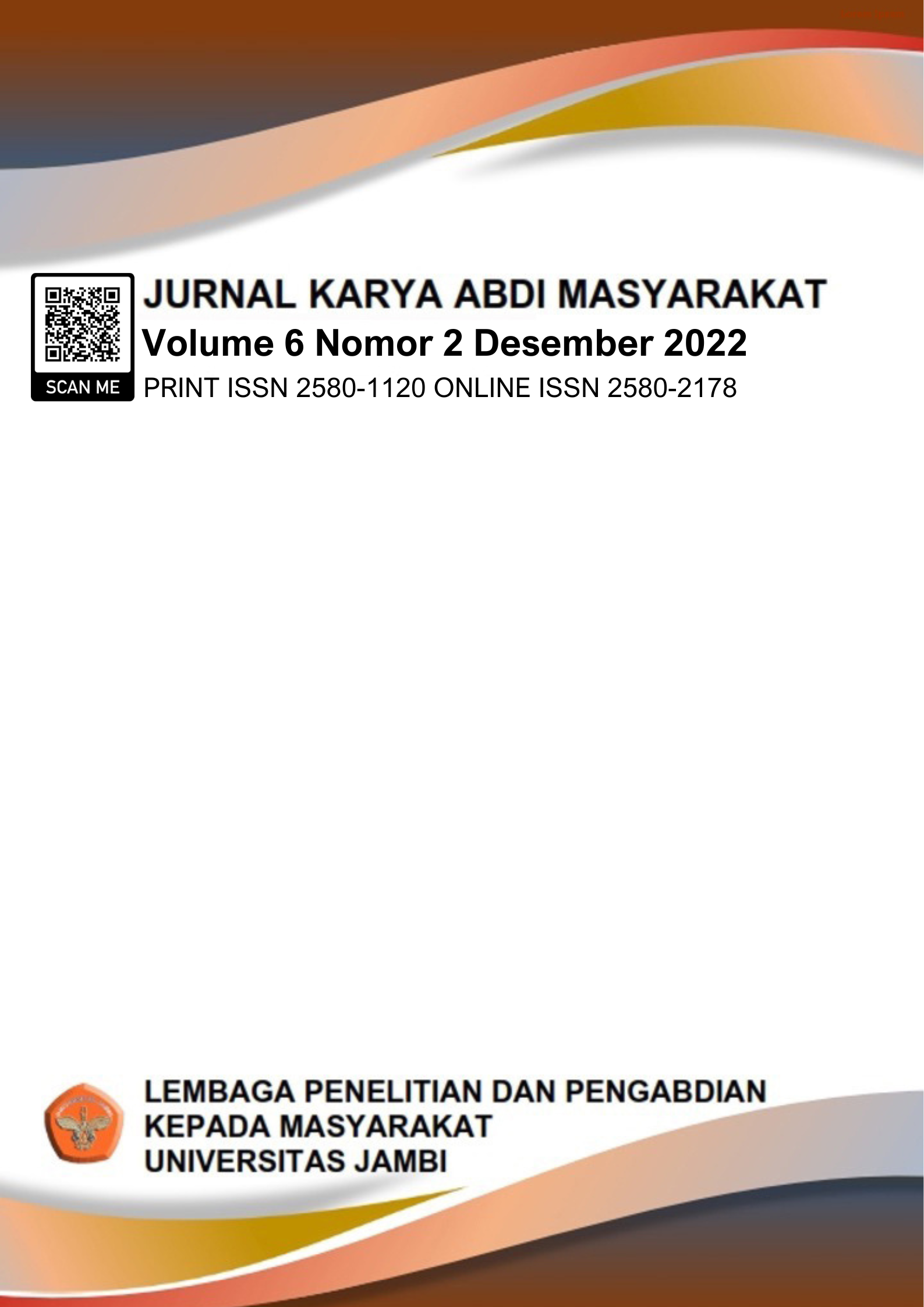Strategi Hilirisasi dan Komersialisasi hasil Riset berbasis Masyarakat di Universitas Riau
DOI:
https://doi.org/10.22437/jkam.v6i2.20079Keywords:
komersialisasi, hilirisasi, kekayaan intelektual, inkubator bisnis, sentra kekayaan intelektualAbstract
Potensi komersialisasi Kekayaan Intelektual (KI) produk hasil-hasil penelitian di Universitas Riau (UNRI) cukup besar. Selain dapat diterapkan pada sektor industri, hasil-hasil penelitian ini juga dapat diaplikasikan pada masyarakat luas. Hal ini sejalan dengan tujuan mulia penelitian dan pengabdian kepada masyarakat yaitu dalam rangka memberikan kontribusi sebesar-besarnya demi kemajuan bersama seluruh bangsa. Kondisi ideal ini sesuai yang diharapkan dari Peraturan Pemerintah Nomor 20 Tahun 2005 tentang Alih Teknologi Kekayaan Intelektual serta Hasil Penelitian dan Pengembangan oleh Perguruan Tinggi dan Lembaga Penelitian dan Pengembangan sebagai peraturan pelaksana UU Sisnas Iptek 2019 dan Permenristek MIPTi No. 24 Tahun 2019. Akan tetapi, proses hilirisasi dan komersialisasi khususnya hasil-hasil penelitian masih memiliki kendala yang menyebabkan hasil riset tidak bisa dirasakan langsung oleh masyarakat luas. Demi tercapainya hal-hal tersebut secara optimal maka peran kelembagaan sangat diperlukan. Melalui peran kelembagaan ini, diharapkan inventor/dosen/peneliti dapat fokus melakukan penelitian yang inovatif dan berpotensi komersil tanpa terbebani memikirkan strategi untuk komersialisasinya. Melalui kegiatan ini telah dilakukan penataan regulasi dan penyiapan dokumen-dokumen (SOP, perjanjian, dll) serta terjalinnya komunikasi dengan berbagai pihak terkait. Hilirisasi dan komersialisasi berbasia masyarakat dinilai memungkinkan untuk dilaksanakan. Hal ini memberikan dampak terhadap percepatan hilirisasi dan komersialisasi hasil riset di Universitas Riau. Di antaranya munculnya program Unggulan Produk Intelektual Kampus (UPIK), pembinaan tenant oleh pusat inkubator, dan yang terpenting adalah inventor/peneliti/dosen yang memiliki potensi untuk dihilirisasi/dikomersilkan, mendapat bimbingan atau arahan dari unit terkait yaitu Sentra KI dan Pusat Inkubator Bisnis dan diharapkan dapat segera dipertemukan dengan mitra yang sesuai.
Downloads
References
Kinnear, Thomas C, Dan Taylor, James R., 1995. Riset Pemasaran, Edisi Tiga, Jakarta: Erlangga.
Kotler, P dan Amstrong. 2018. Prinsip-prinsip Marketing Edisi Ke Tujuh. Penerbit. Salemba Empat. Jakarta.
Kotler, Philip dan Kevin Lane Keller. 2017. Manajemen Pemasaran. Edisi 1.Alih bahasa: Bob sabran, MM. Jakarta :Erlangga
Malhotra, Naresh K. 2004, Marketing Research: An Applied Orientation, Fourth Edition, Prentice Hall, New Jersey
Mokalu, o frendy, & Tumbel, A. 2015. pengaruh kualitas produk, harga dan distribusi terhadap volume penjualan roti jordan CV. Minahasa
Syahza, A., Kozan, O., Sutikno, S., Irianti, M., Mizuno, K., & Hosobuchi, M. (2021). Restorasi ekologi lahan gambut berbasis kelompok masyarakat mandiri melalui revegetasi di Desa Tanjung Leban Kabupaten Bengkalis, Riau. Riau Journal of Empowerment, 4(2), 69-81. https://doi.org/10.31258/raje.4.2.69-81
Subekti, R, Tjitrosudibyo,R. 2008. Kitab Undang-Undang Hukum Perdata, Jakarta: PT. Pradnya Paramita.
Zeithaml, V. Parasuraman, A. and L. Berry L. 2007. “Problems and Strategies in Services Marketingâ€. Jurnal of Marketing Vol. 49. (Spring).
Downloads
Published
How to Cite
Issue
Section
License
Copyright (c) 2022 Hendro Ekwarso, Almasdi Syahza, Evi Nadhifah, Romi Kurniadi

This work is licensed under a Creative Commons Attribution 4.0 International License.
Please find the rights and licenses in Jurnal Jurnal Karya Abdi Masyarakat (JKAM).
- License
The non-commercial use of the article will be governed by the Creative Commons Attribution license as currently displayed on Creative Commons Attribution 4.0 International License.
- Authors Warranties
The author warrants that the article is original, written by stated author(s), has not been published before, contains no unlawful statements, does not infringe the rights of others, is subject to copyright that is vested exclusively in the author and free of any third party rights, and that any necessary written permissions to quote from other sources have been obtained by the author(s).
- User Rights
JKAM's spirit is to disseminate articles published are as free as possible. Under the Creative Commons license, JKAM permits users to copy, distribute, display, and perform the work for non-commercial purposes only. Users will also need to attribute authors and JKAM on distributing works in the journal.
- Rights of Authors
Authors retain the following rights:
- Copyright, and other proprietary rights relating to the article, such as patent rights,
- The right to use the substance of the article in future own works, including lectures and books,
- The right to reproduce the article for own purposes, provided the copies are not offered for sale,
- The right to self-archive the article.
- Co-Authorship
If the article was jointly prepared by other authors, the signatory of this form warrants that he/she has been authorized by all co-authors to sign this agreement on their behalf, and agrees to inform his/her co-authors of the terms of this agreement.
- Termination
This agreement can be terminated by the author or JKAM upon two months notice where the other party has materially breached this agreement and failed to remedy such breach within a month of being given the terminating party notice requesting such breach to be remedied. No breach or violation of this agreement will cause this agreement or any license granted in it to terminate automatically or affect the definition of JKAM.
- Royalties
This agreement entitles the author to no royalties or other fees. To such extent as legally permissible, the author waives his or her right to collect royalties relative to the article in respect of any use of the article by JKAM or its sublicensee.
- Miscellaneous
JKAM will publish the article (or have it published) in the journal if the articles editorial process is successfully completed and JKAM or its sublicensee has become obligated to have the article published. JKAM may conform the article to a style of punctuation, spelling, capitalization, referencing and usage that it deems appropriate. The author acknowledges that the article may be published so that it will be publicly accessible and such access will be free of charge for the readers.








